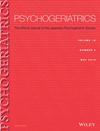Covid-19 大流行期间最年长者中抑郁症的患病率和相关因素:来自大型、具有全国代表性的 "德国老年(D80+)"研究的证据
IF 1.7
4区 医学
Q3 GERIATRICS & GERONTOLOGY
引用次数: 0
摘要
背景迄今为止,大多数针对 80 岁及以上老年人抑郁症患病率和决定因素的研究都使用了受地域限制的样本,无法推广到更广泛的人群中。因此,我们的目的是根据具有全国代表性的数据,确定德国最年长者中抑郁症的患病率及其相关因素。方法数据来自具有全国代表性的 "德国老年(D80+)"研究(n = 8386;2020 年 11 月至 2021 年 4 月),涵盖 80 岁及以上的社区居住者和机构居住者。结果40.7%(95% CI:39.5% 至 42.0%)的样本发现可能患有抑郁症,其中男性占 31.3%(95% CI:29.7% 至 32.9%),女性占 46.6%(95% CI:44.9% 至 48.3%)。可能患抑郁症的几率与女性(几率比 (OR):1.55,95% CI:1.30 至 1.84)、离婚(与已婚相比,OR:1.33,95% CI:1.01 至 1.76)、丧偶(OR:1.14,95% CI:1.00 至 1.30)、教育程度低(例如,中等教育与低教育相比,OR:1.00 至 1.30)呈正相关、中等教育与低教育相比,OR:0.86,95% CI:0.74 至 0.99),生活在机构环境中(OR:2.36,95% CI:1.84 至 3.02),生活在东德(OR:1.21,95% CI:1.05 至 1.39),没有德国国籍(德国国籍与其他国籍相比,OR:0.结论在德国,每 10 位 80 岁及以上的老人中,约有 4 位可能患有抑郁症,这凸显了这一挑战的重要性。了解这一年龄组的特定风险因素有助于解决老年人可能患有抑郁症的问题。本文章由计算机程序翻译,如有差异,请以英文原文为准。
Prevalence and factors associated with probable depression among the oldest old during the Covid‐19 pandemic: evidence from the large, nationally representative ‘Old Age in Germany (D80+)’ study
BackgroundTo date, most studies examining the prevalence and determinants of depression among individuals aged 80 and over have used geographically limited samples that are not generalisable to the wider population. Thus, our aim was to identify the prevalence and the factors associated with probable depression among the oldest old in Germany based on nationally representative data.MethodsData were taken from the nationally representative ‘Old Age in Germany (D80+)’ study (n = 8386; November 2020 to April 2021) covering both community‐dwelling and institutionalised individuals aged 80 and over. The Short Form of the Depression in Old Age Scale was used to quantify probable depression.ResultsProbable depression was found in 40.7% (95% CI: 39.5% to 42.0%) of the sample; 31.3% were men (95% CI: 29.7% to 32.9%) and 46.6% women (95% CI: 44.9% to 48.3%). The odds of probable depression were positively associated with being female (odds ratio (OR): 1.55, 95% CI: 1.30 to 1.84), being divorced (compared to being married, OR: 1.33, 95% CI: 1.01 to 1.76), being widowed (OR: 1.14, 95% CI: 1.00 to 1.30), having a low education (e.g., medium education compared to low education, OR: 0.86, 95% CI: 0.74 to 0.99), living in an institutionalised setting (OR: 2.36, 95% CI: 1.84 to 3.02), living in East Germany (OR: 1.21, 95% CI, 1.05 to 1.39), not having German citizenship (German citizenship compared to other citizenship, OR: 0.55, 95% CI: 0.31 to 0.95), poor self‐rated health (OR: 0.31, 95% CI: 0.28 to 0.34), and the number of chronic conditions (OR: 1.12, 95% CI: 1.09 to 1.14).ConclusionAbout four out of 10 individuals aged 80 and over in Germany had probable depression, underlining the importance of this challenge. Knowledge of specific risk factors for this age group may assist in addressing older adults at risk of probable depression.
求助全文
通过发布文献求助,成功后即可免费获取论文全文。
去求助
来源期刊

Psychogeriatrics
Medicine-Geriatrics and Gerontology
CiteScore
3.60
自引率
5.00%
发文量
115
审稿时长
>12 weeks
期刊介绍:
Psychogeriatrics is an international journal sponsored by the Japanese Psychogeriatric Society and publishes peer-reviewed original papers dealing with all aspects of psychogeriatrics and related fields
The Journal encourages articles with gerontopsychiatric, neurobiological, genetic, diagnostic, social-psychiatric, health-political, psychological or psychotherapeutic content. Themes can be illuminated through basic science, clinical (human and animal) studies, case studies, epidemiological or humanistic research
 求助内容:
求助内容: 应助结果提醒方式:
应助结果提醒方式:


